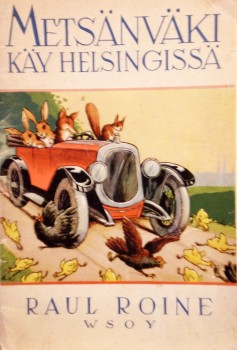Search results for "herbert lomas"
Choosing a play
30 September 1981 | Archives online, Fiction, Prose
A short story from Leiri (‘The camp’). Introduction by Vesa Karonen
The local amateurs were having their theatre club meeting on a Friday evening in the main part of the parish hall. It was late August, the light was beginning to fade and no one had remembered to put the lights on. First the stage grew dark, then the floor, then the ceiling. The light lingered on the inside wall for the longest. There were creaks and groans from the rooms at the back and from the attic. The caretaker had been moving around in there about three in the afternoon, and his traces lingered, as they do in old buildings.
“Something of that sort but short, and it’s got to be bloody funny,” said the chairman, a carpenter called Ranta.
In the store cupboard there were 108 old scripts. Tammilehto, the secretary, hauled out about 30 scripts onto the table. His job was running a kiosk down the road.
“Nothing out of date,” said Ranta.
“There’s got to be a bit of love in it, I say,” said Mrs Ranta.
She had a taxi-driver’s cap on her head and was wearing a man’s grey summer jacket, a white shirt and a blue tie. Her car could be seen from the window. It was in the yard. She always parked her car so it could be seen from inside. More…
New from the archives
13 March 2015 | This 'n' that

Eeva-Liisa Manner. Photo: Tammi.
Today we have a real treat – a selection of the sumptuously minimalist poetry of Eeva-Liisa Manner (1921–1995) by her near-contemporary, the British poet Herbert Lomas (1924–2011).
Born in Helsinki, Manner spent her youth in Viipuri, in what was then part of Finland; her life was, like Eeva Kilpi’s, marked by evacuation from her home and the subsequent loss of Karelia to the Soviet Union in the Second World War. Her breakthrough collection, Tämä matka (‘This journey’, 1956) marked a major arrival on the modernist poetry scene and her work has been widely translated. Always lyrically minimalist, Manner’s poetry sometimes seemed to approach the limits of language – silence:
The words come and go.
I need words less and less.
Tomorrow maybe
I’ll not need a single one,
she wrote in Niin vaihtuvat vuoden ajat (‘So change the seasons’), as early as 1964.
Lomas brought to the delicate, beautiful textures of Manner’s poetry with its themes of grief, suffering and loneliness a bluff Yorkshire, and entirely masculine, sensibility. For him, Manner had a ‘splendid sanity’ and sense of humour; hers was an oeuvre ‘that heals by listening and recovery’.
Manner’s work has more recently been translated by another English writer, Fleur Jeremiah, in a volume entitled Bright, dusky, bright (Waterloo Press, 2009). A sample of the approach taken by a woman of a different generation can be found here.
*
The digitisation of Books from Finland continues apace, with a total of 360 articles and book extracts made available online so far. Each week, we bring a newly digitised text to your attention.
In the land of the living
31 December 1996 | Archives online, Fiction, poetry
Poems by Arto Melleri. Introduction by Maris Gothóni
The airship Italia
Farewell, darlings,
General Nobile's sailing in his airship
to a glittering death...
whoever knows the journey's end
as he sets out is there already,
wafted on his wing-stubs;
farewell, doubters smiles on your lips
like the imprints of horse-bits:
'he'll never get there this way'
'get there' – as if 'there' were
some place;
in one day you can only manage a day's journey,
it's more realistic, far more, to get the measure
of Perdition;
farewell, darlings,
I'm off with him, his scrivener, I'm stretching
over the verge of tears towards boundless laughter,
the dignified business of tarring and feathering,
I'm making notes: this is a dream, a single night's
eternity,
a sound mind's storming of the Bastille;
farewell, you who always know better
what should be done than the doers, and how,
you don't do, you know, you put your hat on a shelf
called History,
General Nobile's flying over the craters of history
northwards, northwards, and the sun's
scoopful of molten tin
is about to splash in the cold ocean,
and the moon's a ball of camphor-soaked cotton wool
wiping the smoking sky,
farewell, darlings, there, flashing ahead,
are the crystal shores of Ultima Thule
From Ilmalaiva Italia (‘Airship Italia’, 1980) More…
Eino Leino Prize to Hannele Huovi
17 April 2009 | In the news

Hannele Huovi. - Photo: Laura Vesa
‘Methinks,/ said the sausage dog / who loved eating verse, that / poetry is tastier than bone.’ (From Karvakorvan runopurkki [Furry pooch’s jar of verse])
Hannele Huovi (born 1949) has received the 2009 Eino Leino Prize, worth € 5,200 and funded by the Finnish Book Foundation, for her extensive work as a writer of books for children and young people, of novels, poetry and text books. More…
The forest folk’s trip to Helsinki
26 March 2015 | Children's books, Fiction
 The country comes to town in this coyly modern fairy story of 1937 by the classic children’s writer Raul Roine (1907-1960). Reynard the Fox, the village taxi-driver, celebrates restoring his beat-up old Ford by taking his woodland friends – squirrels, chaffinches, bobtails… – on a day out to Helsinki. Trouble starts when a policeman tells them off for eating the plants in the Esplanade park, but the fun really begins when the hares find themselves participating in the marathon which is being run through the city streets that day…
The country comes to town in this coyly modern fairy story of 1937 by the classic children’s writer Raul Roine (1907-1960). Reynard the Fox, the village taxi-driver, celebrates restoring his beat-up old Ford by taking his woodland friends – squirrels, chaffinches, bobtails… – on a day out to Helsinki. Trouble starts when a policeman tells them off for eating the plants in the Esplanade park, but the fun really begins when the hares find themselves participating in the marathon which is being run through the city streets that day…
The translation of this delectable tale is by Books from Finland’s long-time collaborator Herbert Lomas (1924-2011), who was often at his best when working on the whimsy of children’s literature.
Spring had come to the forest homeland. The wood anemones were raising their heads shyly from under the moss, large tears of joy were flowing down the spruce trees’ beards of lichen, and sky-ploughs of cranes were coming from the south. They bugled mightily on their trumpets and then landed in the Great Marsh to sample the cranberries More…
Poems
31 March 1981 | Archives online, Fiction, poetry
Introduction by Pekka Tarkka
Wind’s whistling through Europe’s windows
In the moonlight
when the mirrors are screeching
cold light, a silvery curse
the newsreel breaks loose, gallops
the window pane into blackness
Wind’s whistling through
Europe’s windows, the sky’s
full of flying Pickwick Club papers
Just a moment
International terror’s
switchboard diagram: the transistors
are hijacking the plane More…
Mother-days
30 June 2006 | Fiction, poetry
Poems from Yhtä juhlaa (‘It’s all a big celebration’, WSOY, 2006)
(a square metre, 3.)
Now for the-kick-of-being-the-good-mum:
after the rye porridge
after the sons washed with camomile foam
and slipped into clean sheets
with mummy singing a sweet song.
Something about shadowed snow
and how at the blue twilit-moment one can
go inwards. If you’re up to looking. All that garbage and slag:
ash from the too-small days, clotted with
non-combustible blots, even though here
the sky’s clear
and the windows open to the winds.
Good grief, here we’re making new people.
But all I’d time for
was the track from the dishcloth to the nappy bin,
and back from the children’s painting-table
to the sink. No job
for spoilt girls, this: the prissiest minx
would soon turn woman in this fix:
kids coming next after next,
years of full-time labour
in a square metre where
you make no point about peccadilloes,
because so much is at stake.
You’re no longer a rose,
pimpinella, rosabella,
but subsoil: loam
and spots of unrottable compost.
A feebler person would have reversed on
the first tantrum;
the child’s learnt to say things
and is saying things
I never thought would come. More…
End of the carnival
31 December 1991 | Archives online, Fiction, Prose
Extract from the novel Ottopoika (‘Otto the adopted’: Otava, 1991). Introduction by Pekka Tarkka
Verily, verily, keep peace with your God!
The way people are arranged in the courtroom means that Joseph Vissarionovich finds himself in the dock. All right, never mind, if they want to play games with Stalin: they’ll soon find out who comes off second best, very much second best.
The former politburo, led by Trotsky, has occupied the right wing of the front bench. Tanya, the girl from Petersburg, is sitting by Rykov, with her artificial leg under her arm, stuffing her pigtail in her mouth; she giggles and tries to stuff the other pigtail into Rykov’s mouth. Not succeeding, she spits in his face and pulls her skirt over her ears, revealing a small reddish quim. The 1925 politburo appears unmoved, but Trotsky jerks round enough for Stalin to see the axe sticking out of the back of his neck. Meanwhile, a susurrus of tut-tuttings goes round the courtroom. More…
Travelling light
30 September 2005 | Fiction, poetry
Where roads reach through nights
into a fresh infant nightfall
with forest growing rooted to roots and stars,
and darkness canters along
on her black mare,
canters along at a silent pace,
she combs her hair
on the starry comb
and then slips into eyes to sleep.
But here nights are nights
of rooms, mere darkness:
light a light, it’s no night,
put out the light, it’s night,
that’s all,
and not here alone but everywhere
that rooms are ranged in rows
in piles.
Houses sleep, breathe earth’s vastness
so that each of you, alone,
but neighbouring together,
will fill with stars.
From Vaeltanut (‘Travelled’), 1956 More…
Oh heiferiness and humanness
30 September 2007 | Fiction, poetry
Kesäillan kevyt käsitteellisyys.
III laulu: Suvisimfonia, omistettu Joel Lehtoselle.
‘A summer evening’s slight conceptualness’.
III song: Summer symfony, dedicated to the author
Joel Lehtonen (1881–1934)
From Eros (WSOY, 2002)
A summer evening’s slight conceptualness
Ah summer evening, and its eveningness,
its prodigious wonders and their bridgefulness
when the nightunited seamlessness
steals into one’s heart with restfulness
O heiferiness and humanness,
ah shivering shimmeringness,
innocents’ innocuousness
and vastness with its stresslessness –
five or six chicks of a dabchick,
and deep water, lapfulness.
Our blue sky’s mirrored changefulness!
the spruces’ tall topliness, their tips’ sacredness
the yellow-billed black singer’s flutiness.
Nested cosiness, mutual tootiness! More…
The Paradox Archive
30 September 1991 | Archives online, Fiction, Prose
Extracts from the novel Umbra (WSOY, 1990). Introduction by Soila Lehtonen
The Paradox Archive
Umbra was a man of order. His profession alone made him that, for sickness was a disorder, and death chaos.
But life demands disorder, since it calls for energy, for warmth – which is disorder. Abnormal effort did perhaps enhance order within a small and carefully defined area, but it squandered considerable energy, and ultimately the disorder in the environment was only intensified.
Umbra saw that apparent order concealed latent chaos and collapse, but he knew too that apparent chaos contained its own order. More…
Nothing but light
30 December 2003 | Fiction, poetry
Prose poems from Huoneiden kirja (‘A book of rooms‘, Otava, 2003)
The ladies’ room
Behind the shining mirror twin girls are squealing, they disappeared inside the walls long ago. They had plaits, red pompons, bad moods – all of them moulded and twisted by wire coathangers from the very start. They gouged the house full of passageways, they hollowed out the paper walls with silver christening-spoons. They disappeared between the stairs on the staircase, saying: evil’s a gateway onto a void with hundreds of gateways inside. Now they’re in this room, behind this mirror. Now the sun’s rising over the firtree-tops, creeping step by step higher towards the overarching sky. Inside us there are two hundred girl-embryos, the girls shout, they’re handicrafts fashioned by themselves like us: out of pearls, blood, splinters of mirror, it’s these we were made of. If you don’t find us, you’ll not sleep a single night. Until you do you’ll wander about the house, astray with each memory, until your hands are thinner than your words, the days slenderer than your hands. More…


 Leena Kirstinä on the iconoclastic and pioneering poet – for children and adults –
Leena Kirstinä on the iconoclastic and pioneering poet – for children and adults –